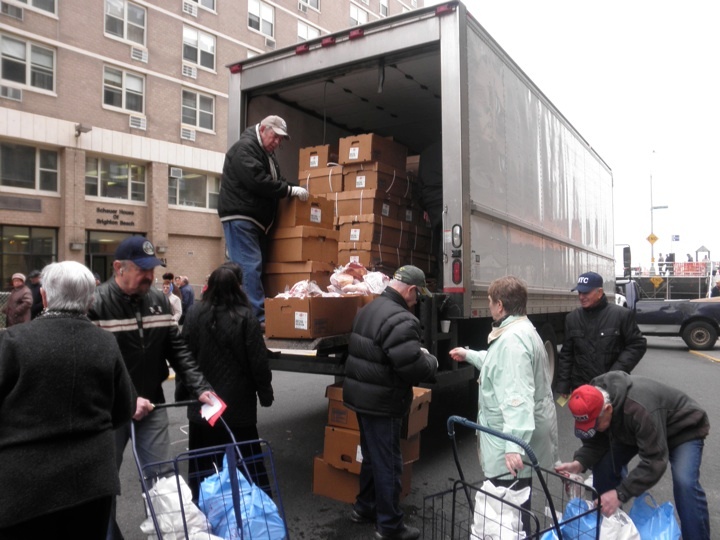Food donation eases the mood in Brighton Beach
Food for Pesach
by Sergey Kadinsky and Michael Orbach
Online exclusive: March 29, 2010/ 14 NissanThe line for the free chickens stretched around the Brooklyn block. Despite their poverty, the elderly crowd composed of immigrants from the former Soviet Union expressed thanks.
“We should kiss this land in gratitude, the elders don’t starve here,” Leonid Shafir, 83, said in fractured English. “Over there, we wouldn’t even be alive at this age.”
A week before Pesach, Monroe, N.Y.-based KJ Poultry, donated 6,000 pounds of chicken to the poor and needy. The Satmar-run poultry processor gave two chickens to each person at the event, which was organized by the Shorefront Jewish Community Center and the Metropolitan Council on Jewish Poverty.
“KJ Poultry felt it was really important to help people that are less fortunate celebrate Pesach in a way that the Jewish people regularly celebrate Pesach,” said Zecharia Mehler, director of media relations for Lubicom, a marketing agency that represents KJ Poultry.
“They understand that this is a very expensive holiday for people who are less fortunate. It's hard to make a Seder,” he said.
Initially, said Mehler, the company planned to donate 4,000 pounds of chicken, but a concern that the demand would be far greater led the company to add an additional 2,000 pounds to its gift.
The Shorefront JCC served 1200 people; a separate donation to 500 people took place at the Coney Island JCC.
“I worked as a shoemaker here, and I was hoping to make it big,” lamented Odessa native Yakov Rozenberg, 71, as he stood on line. “Now I live on Section 8 [a welfare program]. Depending on the months, we are not too poor, but the food program helps in a big way.”
The donation was more than timely, said Rachel Krich, director of the Shorefront Jewish Community Center. This Pesach is falling at a time of unprecedented budget cuts for social service programs around New York State. Most of the people her center serves are elderly, Krich said; 50 percent are Holocaust survivors, she added.
“Things that are being cut are being noticed by the people who have the least amount of voice,” she explained.
The blighted economic situation has also exacerbated the impact of reductions in funding, according to Met Council community manager Sarah Felsenthal.
“With this recession, demand has risen by approximately 35 percent for our food packages,” she said.
The center serves at least 500 meals a week to those in need, Krich said. To qualify for the free meals families must earn no more than $200 more than their rent, which in Brighton Beach tends to run in the $700 range.
The Shorefront JCC is also part of the Metropolitan Council for Jewish Poverty's food pantry program and serves 1100 additional meals a month, as well as maintaining a stock of emergency food preparations. Recipients of food pantry donations are usually families that are under-employed or partially employed. A vocational program operated by the South Shore JCC with the assistance of the United Jewish Appeal was cut last year at the height of the Madoff scandal.
The situation for the poor in Brighton Beach is dire, according to Krich, who said the JCC is serving to capacity and will soon be forced to turn away those in need.
As fifteen volunteers handed out chickens from the back of a KJ Poultry truck, many recipients spoke of the blue-collar jobs they used to hold as mechanics or shoemakers. The income they made was insufficient to sustain them in retirement.
“Our rent is our biggest monthly expense,” said Victor Leschinsky, 72. “This food calms my nerves.”
“A friend at the beach told me about this,” said Meyer Cherner, 75.
“If you are on SSI, you qualify,” he said.
Most of the people in line were not traditionally observant, but the majority indicated that they planned to attend a Seder.
“Helping the poor during the holiday period is an integral part of the Jewish tradition,” Joel Weiss, the manager of KJ Poultry, said.

 46.0°,
A Few Clouds
46.0°,
A Few Clouds 




